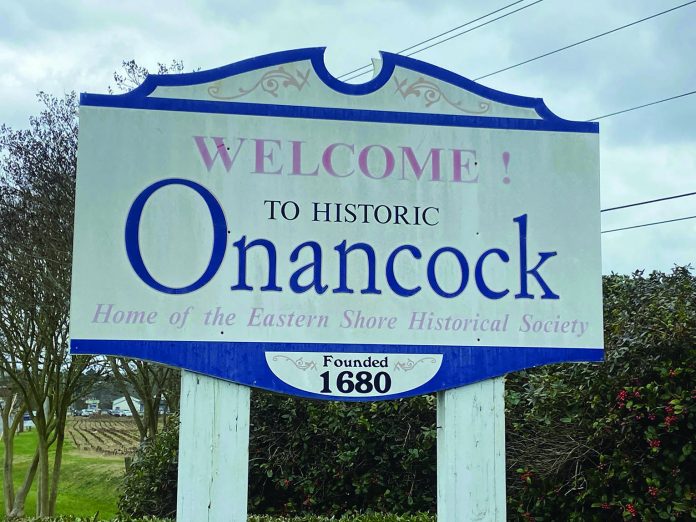By Carol Vaughn —
Onancock officials will continue work on updating the town’s comprehensive plan after a public hearing was held Aug. 23.
Town Manager Matt Spuck said the plan will go back to the planning commission for review, with consideration of public and council member comments, before the commission makes a final recommendation to the Town Council.
The planning commission’s next meeting is Tuesday, Sept. 21, at 5:30 p.m., at the town hall.
The draft plan may be viewed at the town office or online at https://www.onancock.com/sites/default/files/fileattachments/town_council/page/8142/comp_plan_for_ph.pdf
Mayor Fletcher Fosque during the hearing read a letter from Michael Ward about the plan.
Ward called the plan’s vision statement “vague.”
The statement reads: “Onancock will continue to be a safe, thriving, year-round waterfront community that embraces its historic character and cultural assets while poised for the future.”
Ward said one strength is the plan has categories based on specific issues, then discussion of those issues with specific data, leading to a summary and list of goals.
Still, Ward said almost all the issues relate to physical features, such as natural resources, groundwater, existing land uses, zoning, transportation, and housing, among others.
Only two sections address non-physical features — demographics and the economy — he said, and neither section includes goals, as the other sections do.
“There are some issues which don’t easily fit into a single category,” Ward wrote, saying the plan does not include discussion of issues such as poverty, racial diversity, income equality, women’s opportunities, education, changes in sources of town revenue, or income disparity between men and women.
“In many ways, the ability to plan ahead is dependent upon discovering trends from the past,” Ward wrote, saying much of the data used only goes back 10 years — a decade he called “somewhat unique,” including a recession’s aftermath, followed by an economic upturn generated by technology, “complicated by fluctuating economic policies and then the impact of a pandemic.”
A longer perspective would be helpful to identify trends, he said, citing the rising median age of town residents as an example.
The median age rose by 12 years since 2000.
An older population has implications for planning, including types of services and housing residents will require in the future and what they spend money on, according to Ward.
“From a planning perspective, should the town try to capitalize on this trend by creating an environment that not only serves their needs but attracts others, such as creating zones for smaller homes and more dense housing?” he said.
Services for older people require a trained workforce, but “As the pay is often low, where is the housing for this workforce?” Ward said.
He asked whether Onancock wants to attract younger people or people who work from home, which could affect land use and zoning policies.
“Each of these subsets offers prospects for growth and revitalization, but there is no consideration of which alternative is the most compatible with the overall vision, and this lack of clarity or direction could result in missed opportunities,” Ward wrote.
He said it is unclear if a decision has been made to target “a particular demographic group as the fundamental building block for the future.”
There was no other public comment at the hearing.
ARPA Work Session Set
The Town Council scheduled a work session Monday, Sept. 20, at 5:30 p.m., to discuss how to use federal funds the town is receiving from the American Rescue Plan Act.
Homestay Policy
Town Manager Matt Spuck said the planning commission is continuing work on the homestay, or short-term rental, policy. He encouraged interested people to attend the next planning commission meeting.
Mayor Fletcher Fosque read a letter from 43-year resident Claudia Bagwell about Airbnbs and other short-term rentals.
Bagwell cited noise concerns and “loss of neighborhood character” stemming from the number of homestay properties.
Several speakers at the August planning commission meeting suggested Onancock suspend permits for short-term rentals if they violate noise regulations three times, which would address noise concerns, she said.
Still, Bagwell called loss of community the more important issue.
“Onancock is becoming a town of part-time residents,” she wrote, adding, “Short-term rentals are fueling this trend.”
Bagwell noted Onancock’s population declined 7% in the past decade, according to 2020 U.S. census results.
“At some point, full-time residents will not be drawn to buy houses in Onancock because of the prevalence of short-term rentals. Our friendly, neighborly town will be lost. A tourist-oriented community will take its place. Onancock may still be a nice place, but it won’t be the same kind of place,” she said.
She said there are existing accommodations for nearly 250 visitors in or close to Onancock, including 58 at bed-and-breakfast inns, more than 160 at Airbnbs or VRBOs, and 28 on boats at the town’s boat slips, at two guests for each slip.
Bagwell asked officials to cap the number of short-term rentals.
Council member Joy Marino said the council needs “data-driven research of what happens to small, tourist communities when Airbnbs take over,” both the positives and negatives, and needs to hear from residents.
“This will determine the future of Onancock for decades to come. … This is a very serious issue,” she said.
Council member Sarah Nock said it is important to know “where the thresholds are, where the tipping points are for the shifts.”
Fosque suggested contacting other small towns for information.



